UNI calls for comprehensive regulation of private equity industry

Speaking at the UNI Europa management committee in Brussels last week, Regional Secretary Bernadette Ségol said, “The hedge fund and private equity funds have launched a massive and well-funded lobbying exercise to stop regulatory reform in its tracks. It is vital that the trade union movement everywhere spares no effort in ensuring that hedge fund and private equity firms do not escape.”
What more evidence do we need, she said, to condemn the hedge fund activity to sink and make profit from the crisis facing Greece, just weeks after hedge funds manipulated markets during the Kraft takeover of Cadbury?
UNI Global Union General Secretary Philip Jennings met with the private equity industry at the Super Returns 2010 conference in Berlin.
“They have to realize that regulation is on the way,” said Jennings of industry executives. “We are not asking for the earth. We are asking for a level playing field between private equity and hedge fund managers and other asset managers and between portfolio companies and listed companies regarding transparency and accountability to supervisory authorities and to the markets. It is time both globally and in Europe that the private equity industry begins a meaningful dialogue with the trade union movement.”
The European Union is proposing a directive on Alternative Investment Fund Managers (AIFMs ) that would “create a comprehensive and effective regulatory and supervisory framework for AIFMs at the European level.” UNI and the trade union movement support the regulation.
Private equity companies at Super Returns claimed they would fight the regulation “tooth and nail.”
Jennings stressed that there were growing fears that the next financial bubble to burst is in private equity owned portfolio companies. He recalled that three years after the last private boom in the late 1980s years ago some 40 percent of private equity owned companies were faced with severe financial difficulties.
The trade union movement is seeking reassurances that history is not about to repeat itself, Jennings said.
He said the trade union movement is insisting on an adequate regulatory framework for private equity sector in meetings with the G20 and the European Union in the weeks and months to come.
“The EU and G20 have to face down this lobbying exercise from these powerful financial interests,” Jennings said.
The lack of regulation is causing profound problems for working people around the world.
Derivatives Trouble spreads to Italy
An article in today’s Financial Times shows that the bad advice on risky derivative investments has brought similar problems to those in Greece to towns, cities and regions in Italy. There, traders convinced local governments to invest in derivatives instruments that many of the governments did not understand at all.
There is a growing chorus of concern about financial products being pushed aggressively on local government and local councils and now is the time for effective regulation, Jennings says.
According to the FT, this sentiment is echoed by the local authorities in Italy who fell prey to predatory lending practices.
“Derivatives must be banned – anywhere, everywhere – for all local authorities,” Antonietta Dominici, the local treasurer of Baschi, Italy, told the FT. She is suing BNL, a Roman bank now owned by BNP Paribas, over the derivatives deals she entered into, which have left her facing mounting debts that could cripple her town, the newspaper said.

